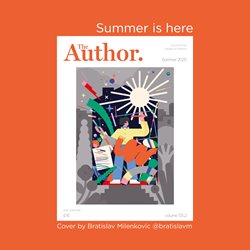 Emerging from lockdown
Emerging from lockdown
By James McConnachie
As I sat down to draft this – the hardest editorial I’ve yet had to write – the author Sarah Vaughan asked fellow writers of fiction, on Twitter, whether they were ignoring Covid-19 in their novels-in-progress, or referencing it. ‘I’ve two characters meeting in a grotty pub for a drink’, she explained. ‘It’s occurred to me that might seem anachronistic for any novel published in the future.’
Her question exposes, in the way that a ripped-off bandage exposes, the radical doubt that now besets us. What elements of our previous lives will again be present in a future that might be better called peri- than post-Covid? Will there be pubs? Will there be publishers? The big beasts will survive, but more than half of independent publishers, according to a recent Bookseller survey, have warned that they may not. And how will we begin to think again about conceptualising futures, let alone fictional realities, in a world that seems suddenly liable to catastrophic change? The SARS-CoV-2 virus will eventually be tamed, but the world will remain changed – by the understanding that the world can be changed.
Like Vaughan’s work-in-progress, this Summer issue of The Author may feel dated by the time you read it. We offer three articles on lockdown – which I’m hoping will be a memory not a present state by the time you read them. Ben Fergusson considers online historical research, and the snobbery that it sometimes attracts. Ben Myers discovers what it means to be published when all bookshops are closed. Dan Richards – appropriately, the author of Outposts, a book about remote and isolated shelters in the wilderness – lets us into his lockdown world. Ann Morgan, meanwhile, considers the wider phenomenon of the ‘plague diary’, a genre whose existence can perhaps bring comfort, by reminding us that we are not the first generation to face such a threat.
I’ve always promised members and readers that The Author under my editorship will not be depressing – despite the multiple threats to our industry and our livelihoods within it, and despite the pandemic. Accordingly, we have Merryn Glover on her Cairngorms residency, and the value of drawing inspiration from the natural world. We have Tiffany Francis-Baker on darkness, and its potent place in the authorial universe. And Jason Y Ng sends us his Letter from Hong Kong – a city where authors are at the heart of resistance to despotism and the curtailment of free speech.
As always, our core practical articles are here too. Judith Heneghan reveals how much authors’ writing groups have to offer, especially at times of isolation. Claire Fuller offers a how-to guide to author newsletters – a genre, which, at its best is a conversation as much as a marketing tool. And Sarah McIntyre advises those of us who work only with words on how we can collaborate better with our illustrator cousins.
I do not know where we will be, as a society, when you read this. But I know where we will be as a Society: there for our members, just as we have been since we were founded in 1884. And ‘there’ means more than offering advice on contracts and wellbeing. At the start of the pandemic, the SoA mobilised with astonishing speed, and raised £1 million for its Emergency Fund for authors from sources including ALCS, Amazon UK, Arts Counc il England, the Royal Literary Fund, the T.S. Eliot Foundation in partnership with English PEN, and a number of extraordinary individual benefactors. At the time of writing, around £835k had been distributed to over 600 authors.
il England, the Royal Literary Fund, the T.S. Eliot Foundation in partnership with English PEN, and a number of extraordinary individual benefactors. At the time of writing, around £835k had been distributed to over 600 authors.
Writing can be a lonely business. Publishing can be a ruthlessly competitive one. Authorship is different: it is a fellowship and a community.
James McConnachie
mcconnachie.tumblr.com | @j_mcconnachie
Cover artwork by Bratislav Milenković:
'[I wanted to] show the contrast and difference in the atmosphere of the gloomy outdoor world and the playful and creative space that our homes have become.'
From a Q&A with Bratislav in the Summer 2020 issue.
In this issue
LOCKDOWN
Indoorsman – Dan Richards on getting through lockdown
Messages in bottles – Ann Morgan asks: what is our role in a health crisis?
Publishing in lockdown – Journey into the unknown, by Ben Myers
Did East Berlin smell different from West Berlin? – Ben Fergusson on historical research online
Q&A: Bratislav Milenković – This issue’s lead illustrator
FEATURES
A sense of place – Merryn Glover gets closer to nature
In the cover of darkness – Tiffany Francis-Baker writes on the value of the night
Going primitive – A different kind of translation, by Iain Gailbraith
Letter from Hong Kong – Jason Y. Ng writes from a city on edge
AUTHOR LIFE
Author newsletters – Claire Fuller offers advice
Ask an Author: Sarah Waters – On tradition, mayhem and starting again
The company of others – Judith Heneghan on the benefits of writing groups
Illustrators mean business – Sarah McIntyre on approaching illustrators
ALCS and CLA: Behind the acronyms – Tony Bradman elaborates
Grub Street – Andrew Taylor’s quarterly digest
FROM THE SOA
News – Copyright, author earnings and more
The 2020 Society of Authors’ Awards – Introducing this year’s winners
What’s on? – Online events in June and July
Spotlight: SoA groups – Latest activities and events
Letters to the Editor
Welcome, new members
Services for authors